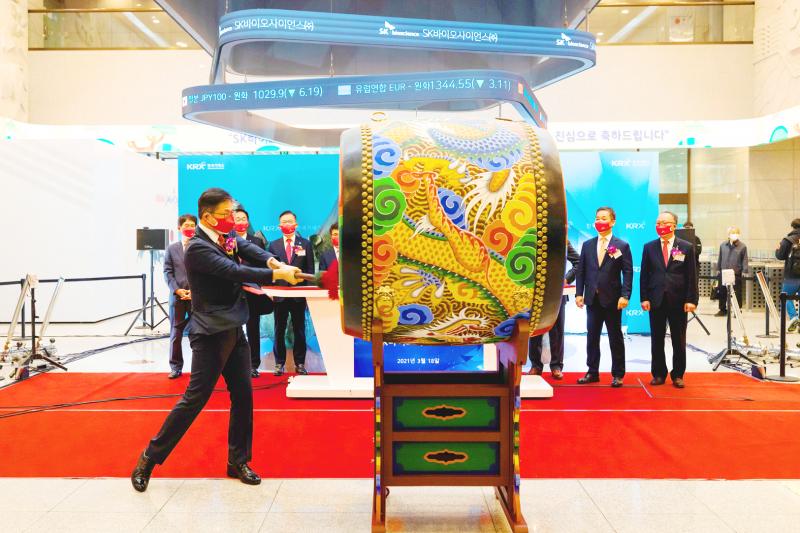Concerns over potential side effects of AstraZeneca PLC’s COVID-19 vaccine failed to dent the trading debut of its South Korean partner, SK Bioscience Co, which yesterday finished its first day of trading with a 160 percent gain, boosting its market capitalization to 12.9 trillion won (US$11.5 billion).
Following a record number of bids from retail investors for its US$1.33 billion initial public offering (IPO), shares of SK Bioscience soared by their daily limit to 169,000 won from the float price of 65,000 won.
The heavily subscribed IPO by SK Bioscience, the local manufacturer of AstraZeneca’s vaccine, is the largest domestic listing since game developer Netmarble Corp raised US$2.39 billion in 2017.

Photo: Bloomberg
It comes just a week after a hot US$4.6 billion New York share sale by e-commerce giant Coupang Inc drew attention to South Korean listings globally.
SK Bioscience’s debut comes as several EU countries, such as Germany and France, temporarily suspend the AstraZeneca vaccine rollout on worries about side effects.
While the WHO has said that the vaccine should continue to be administered, the European Medicines Agency was to provide a definitive assessment yesterday.
“It is difficult to tell exactly how much negative impact this will have on SK Bioscience,” analyst Douglas Kim said in a note on investment research network Smartkarma before its trading debut.
South Korea plans to inoculate 12 million people before July, with early batches of the vaccine relying mostly on AstraZeneca shots manufactured in SK Bioscience’s factory in Andong, South Korea.
SK Bioscience last month signed a licensing agreement with Novavax Inc to manufacture its COVID-19 vaccine in South Korea.
SK Bioscience is among numerous South Korean companies trying to ride the boom market after the country’s benchmark KOSPI soared 30 percent last year on a flood of retail buying.
Drugmakers and healthcare stocks were among the biggest winners since the start of the COVID-19 pandemic, although their stock price gains have lost steam this year.
SK Bioscience benefited from retail investors’ hunger for shares. South Korean mom-and-pop buyers poured in a record 63.6 trillion won to get their hands on SK Bioscience shares, beating the previous 59 trillion won in retail bids for last year’s US$321.5 million IPO by Kakao Games Corp, the gaming unit of South Korea’s leading messaging app, Kakao Corp.
Institutional investors, who made up 55 percent of the SK Bioscience IPO, also poured into the offering. Bids from institutional investors were oversubscribed by 1,275 times.
SK Bioscience has said that it is planning to use the IPO proceeds for research and development, as well as the construction of a plant to produce the next-generation pneumococcal vaccine in its pipeline, among other things.

BYPASSING CHINA TARIFFS: In the first five months of this year, Foxconn sent US$4.4bn of iPhones to the US from India, compared with US$3.7bn in the whole of last year Nearly all the iPhones exported by Foxconn Technology Group (富士康科技集團) from India went to the US between March and last month, customs data showed, far above last year’s average of 50 percent and a clear sign of Apple Inc’s efforts to bypass high US tariffs imposed on China. The numbers, being reported by Reuters for the first time, show that Apple has realigned its India exports to almost exclusively serve the US market, when previously the devices were more widely distributed to nations including the Netherlands and the Czech Republic. During March to last month, Foxconn, known as Hon Hai Precision Industry

Taiwan Semiconductor Manufacturing Co (TSMC, 台積電) and the University of Tokyo (UTokyo) yesterday announced the launch of the TSMC-UTokyo Lab to promote advanced semiconductor research, education and talent development. The lab is TSMC’s first laboratory collaboration with a university outside Taiwan, the company said in a statement. The lab would leverage “the extensive knowledge, experience, and creativity” of both institutions, the company said. It is located in the Asano Section of UTokyo’s Hongo, Tokyo, campus and would be managed by UTokyo faculty, guided by directors from UTokyo and TSMC, the company said. TSMC began working with UTokyo in 2019, resulting in 21 research projects,

Ashton Hall’s morning routine involves dunking his head in iced Saratoga Spring Water. For the company that sells the bottled water — Hall’s brand of choice for drinking, brushing his teeth and submerging himself — that is fantastic news. “We’re so thankful to this incredible fitness influencer called Ashton Hall,” Saratoga owner Primo Brands Corp’s CEO Robbert Rietbroek said on an earnings call after Hall’s morning routine video went viral. “He really helped put our brand on the map.” Primo Brands, which was not affiliated with Hall when he made his video, is among the increasing number of companies benefiting from influencer

Quanta Computer Inc (廣達) chairman Barry Lam (林百里) yesterday expressed a downbeat view about the prospects of humanoid robots, given high manufacturing costs and a lack of target customers. Despite rising demand and high expectations for humanoid robots, high research-and-development costs and uncertain profitability remain major concerns, Lam told reporters following the company’s annual shareholders’ meeting in Taoyuan. “Since it seems a bit unworthy to use such high-cost robots to do household chores, I believe robots designed for specific purposes would be more valuable and present a better business opportunity,” Lam said Instead of investing in humanoid robots, Quanta has opted to invest